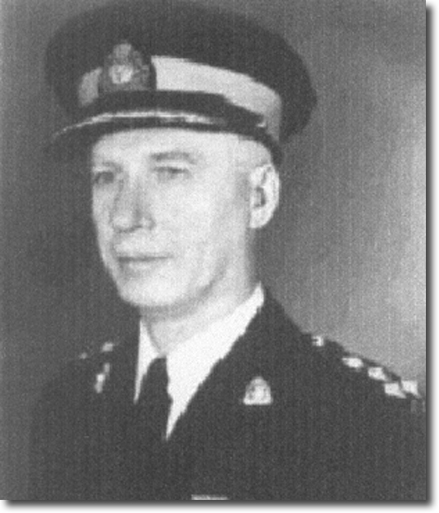|
|

 |
|
May 1, 1951 - March 31, 1959 Leonard Hanson Nicholson, the first Maritime Commissioner of the RCMP, was born on June 8, 1904 at Mount Middleton in King's County, New Brunswick. At age nineteen, he joined the RCMP. In 1928, Nicholson joined the newly created New Brunswick Provincial Police Force, and moved to the Nova Scotia Provincial Police in 1930. When this force was absorbed into the RCMP two years later, he rejoined the Force as an Inspector. Between 1932 and 1937 he was put in charge of Criminal Investigations in Nova Scotia, and from 1938 to 1941 headed the same department in Saskatchewan. During World War II, Nicholson served with the Canadian army, in England, Italy and Northwestern Europe. He rose to the rank of Colonel and was appointed Provost Marshall of the Canadian Provost Corps. After the war, Nicholson returned to Ottawa where he was appointed Commissioner of the RCMP on May 1, 1951. His principal accomplishment as Commissioner was an extensive building programme aimed at providing proper accommodations for Force members and employees at all levels, from detachments to headquarters. He also reorganized the administration of the Force, increased manpower and upgraded transport and communications technology to increase efficiency. He worked closely with the Blackfoot Confederacy and the Blood Tribe, thus becoming an Honorary Chief of both groups, in 1955 and 1957 respectively. Two of his personal achievements were an epic patrol by dog team along the Arctic coast of the Northwest Territories and establishing the RCMP Regimental March. Commissioner Nicholson resigned from the RCMP on March 13, 1959 due to a disagreement over sending 50 mounted police troops to control a labour dispute in Newfoundland. As the RCMP is not an autonomous organization, federal approval was necessary for the additional manpower, and it was refused on the grounds of disrupting policing elsewhere. Nicholson did not agree, and regarded the government's decision as a breach of faith which prevented the Force from fulfilling its contract with the province. After his resignation from the Force he served as Chief Commissioner of the St. John Ambulance Brigade in 1960, as Chief of Protection and Investigation for the Bank of Nova Scotia until 1965, and as a member of the Canadian General Council of the Boy Scouts Association from 1965 to 1971. He was heavily decorated for his service to Canada. For his war service he was appointed a Member of the Order of the British Empire and also received a Defence Medal and several World War II Stars. In1969 he was Knighted Chancellor of the Venerable Order of the Hospital of St. John of Jerusalem. In 1971 he was awarded the Bailiff Grand Cross, the highest post in the Order of St John Ambulance. The same year he also received the Elizabeth II Jubilee Medal. Numerous other awards received were the Canadian Volunteer Service Medal, the Confederation Medal, the RCMP Long Service Medal, the St. John Long Service Medal, the Order of Canada. He was made Vice President and Council Member of the Dominion of Canada Rifle Association. Nicholson died in Ottawa on March 22, 1983 and was buried in the Force Cemetery in Regina. In 1989, the RCMP headquarters building in Ottawa was named in his honour. |
Armed Forces | Art and Culture | Articles | Biographies | Colonies | Discussion | Glossary | Home | Library | Links | Map Room | Sources and Media | Science and Technology | Search | Student Zone | Timelines | TV & Film | Wargames
